Perhaps you’re wondering if Coursera is the right learning platform for you.
In the last few years, online learning platforms and massive open online courses have grown in popularity.
The demand for distance learning has prompted universities and colleges from around the world to partner with learning platforms to offer their courses, trainings, and degrees to online learners.
In this article, I'll review Coursera, talk about their certifications, how much it costs and will give my honest opinion on whether or not Coursera is worth the price.
Let's get to it…
What Is Coursera?
Coursera is an educational service platform that offers massive open online courses (MOOCs) in a wide array of topics. The goal of Coursera is to provide high-quality education to practically everyone. Coursera partners with over 150 distinguished universities and colleges from around the world. Coursera has more than 2,500 courses, hundreds of specializations, and four academic degrees offered to its 40 million learners (and counting).
The courses are 100% online. There is also a Coursera app for your smartphone. Once you enroll in your course of choice, the learning materials and other resources are accessible to you anytime, anywhere.
Coursera is ideal for those who want to learn something new, and for those who want to enhance their skills, especially if the coursework is career-related.
10 Best Coursera Certifications and Courses for 2025
Want to jump in to see what Coursera has to offer?
If so, I have researched their entire website and checked student feedback, to provide you with this list of the top best coursera courses:
| FREE Class from YaleFREE Class from YaleThe Science of Well-Being | LEARN MORE |
| GoogleGoogleGoogle IT Automation with Python | LEARN MORE |
| IBMIBMIBM Data Science | LEARN MORE |
| StanfordStanfordMachine Learning | LEARN MORE |
| University of MichiganUniversity of MichiganPython for Everybody | LEARN MORE |
| GoogleGoogleGoogle IT Support | LEARN MORE |
| deeplearning.aideeplearning.aiDeep Learning | LEARN MORE |
| Johns Hopkins UniversityJohns Hopkins UniversityData Science | LEARN MORE |
| Georgia TechGeorgia TechFundamentals of Engineering Exam Review | LEARN MORE |
| University of Pennsylvania and UNICEFUniversity of Pennsylvania and UNICEFSocial Norms, Social Change | LEARN MORE |
How Much Does Coursera Cost?
There are thousands of FREE courses available on Coursera. Once you enroll, you are given access to all the learning materials (handouts, videos, etc.). However, to earn certifications or degrees, Coursera charges the following rates for three types of certificates (figures are in US dollars):
#1. Coursera Course Certificate
Although it is free to enroll in many of the courses, payment is required to access the auto-graded exercises, quizzes, exams, and peer-reviewed papers. These graded classwork materials are also required to get your certificate upon completion of the course.
Lessons last between four and six weeks. Price: $29–$99/course certificate.
Many courses are offered for a one-time payment that allows you to have access to the course material for 180 days. You can see how much each individual course costs on its respective home page, and any applicable sales tax will be noted on the checkout page.
Some courses are part of specializations, which means you cannot enroll for free. These courses are only available through subscription payments. With a subscription to courses in a specialization, you are required to pay a fee each month to gain access to all of the courses in that specialization.
After subscribing to a course or specialization, you'll be charged each month until you earn a certificate in every course in your specialization, or you cancel your subscription.
There may be some variation in the prices for courses or specializations due to their continual adjustment of their offerings based on new information regarding the value that their courses offer to learners. Prices may also vary if you are using the iOS mobile app.
#2. Coursera Specializations
This option earns you a specialization certificate in the career-specific skill you want to master. Lessons last between four and six months. Price: $39–$79/month.
As long as your subscription is active, you will have access to all of the courses’ materials for each course in that specialization. While you can cancel your subscription at any time, there are no partial refunds available for subscriptions, so you will need to cancel your subscription before the date of your next payment.
When you are enrolled in a specialization, you will have paid access to all of the courses in that specialization. If you want to gain access to another course or specialization that is not included in your subscription, you will have to make an additional payment.
Coursera also offers a seven-day free trial for specializations, so if you find that the program is not for you, you will not be charged if you cancel within that first week of signing up.
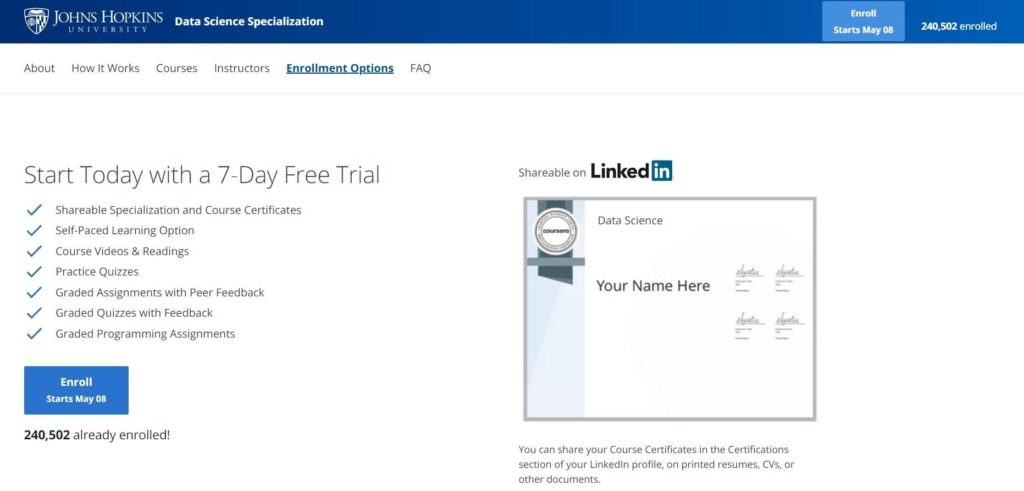
#3. Coursera Online Degrees
Your online coursework earns you a university-accredited and recognized degree. It takes between one and three years to earn a degree with Coursera, and costs between $15,000 and $25,000 per degree. This is a stark difference in price compared with MBA degrees that can cost upwards of $100,000.
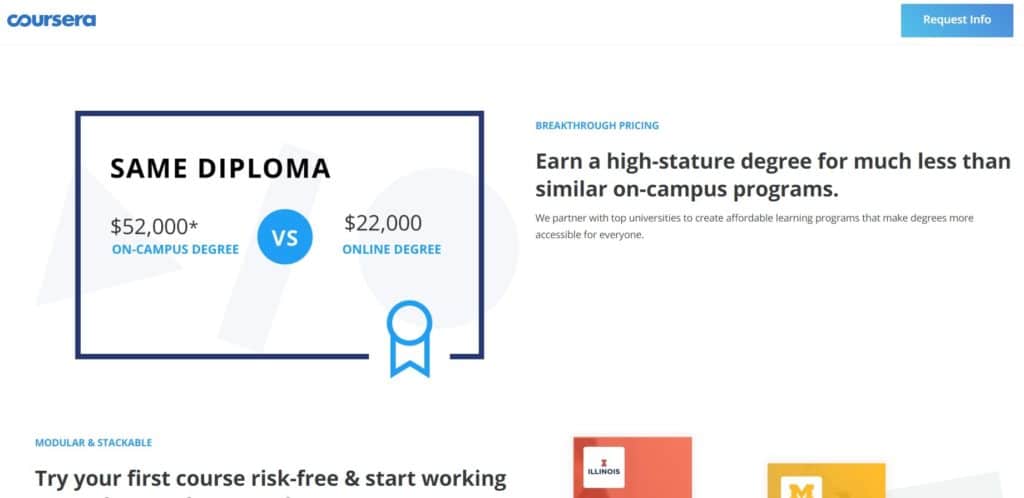
TIs Coursera Legit and Worth It?
Yes! Coursera provides a global open online course learning system for students to enhance their learning with over 2,500 courses, specializations, and academic degrees. That said, Coursera is an open platform, so each specific course will vary in quality and depth of information.
To give you an idea of what you get, let's take a peak under the hood, so you can make your own decision about whether or not Coursera certifications are really worth it…
A. Learning Programs
Currently, Coursera offers five types of learning programs:
#1. Courses
Coursera allows you to choose from over 3,200 online courses taught by top instructors from the world’s highest ranking universities and educational institutions. Courses consist of recorded, auto-graded, peer-reviewed assignments, video lectures, and group discussion forums.
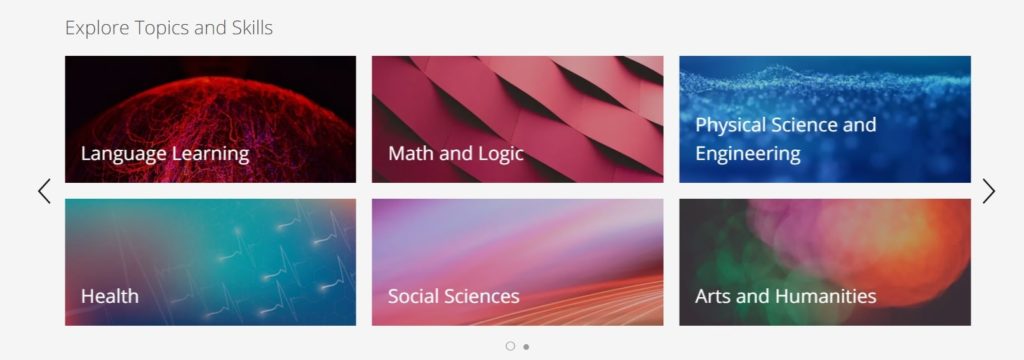
After completing a course, you can receive a shareable electronic version of your course certificate for a small fee. Course certificates that are received on Coursera will not give you professional or academic credits.
#2. Specializations
If you’re aiming to master a career-related skill, enrolling in the program under “specializations” gives you access to a series of courses to help you achieve your goals. A specialization is essentially a selected group of courses on one specific topic.
For example, if you want to learn about data science, you can either take a standalone course or you can choose to specialize in the topic and take a bundle of courses related to data science, but covering various aspect of this field. When you complete a specialization, you get a unique certificate of completion for successfully graduating. Coursera currently offers 310 specializations. (As mentioned before, one of my favorites is the course on The Science of Well Being.)
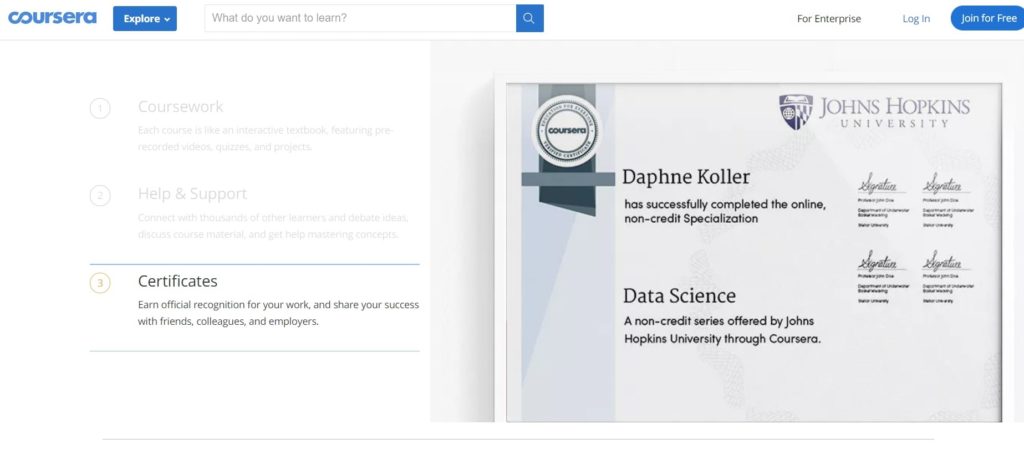
#3. Professional Certificate
These are training programs that prepare you for prospective jobs. Some of the training programs give you the necessary foundations to pass certifying exams in specific industries, and provide the required experience and skills needed to set out in your chosen career.
To earn a professional certificate, you first enroll in the professional certificate program, which may require submitting an application. You then need to pay for the program, pass all of the required courses, and meet any requirements (such as maintaining a specific GPA).
Once you complete the work for your professional certificate, it will confirm that you have successfully completed the program. Your certificate will then be issued by the institution behind the program (not Coursera).
Your professional certification may or may not be recognized or accepted by another organization or school. If you need to know if a Coursera certificate will be accepted as work toward accreditation for a certain organization or program, you will need to make an inquiry to that organization or program.
#4. MasterTrack Certificate
With this learning program, you get hands-on projects and instruction from live experts. The difference from the regular masters (degree) program is that in MasterTrack the lessons are in modular format.
This way, you can earn a career credential online at a lower price. You can learn from real-world projects, interactive learning with peers, and live expert instruction. If you apply to and are accepted into the full masters program, your MasterTrack certificate will be applied towards your degree.
Some subjects that you can get a MasterTrack certificate in include construction engineering and management, digital marketing, and constructional design.
#5. Degree
Study online at your own pace and receive the same degree granted to students attending conventional classes on campus. This is a big deal, just as it would be getting a degree by attending a university.
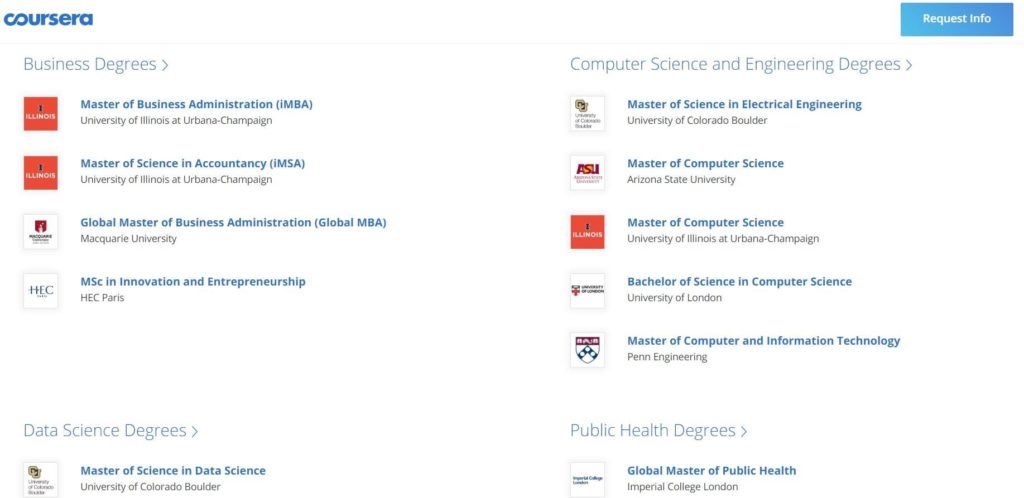
If you choose to pursue a degree, you are essentially going to that university—you're just doing the work online. Coursera offers a wide range of degrees that you can obtain, with most of them revolving around business and IT.
B. Enrolling in a Coursera Course
What exactly do you get when you enroll in a Coursera course?
Course Information
Click on a course you’re interested in and you’ll be directed to a page with all the details about the course. An overview of the course, the syllabus, and enrollment options are some of the details you’ll find on this page.
Some users may see an option to subscribe to the whole Coursera catalog. If you choose to do this, you’ll still need to enroll in each course to have access to the course materials, but you will not need to pay for the course because it will be included in your subscription.
Course overview
This is information about what to expect and what is required of you in the course. It often includes the course objectives/goals, and possibly some recommendations from the instructor as to how you can get the most out of taking the course.
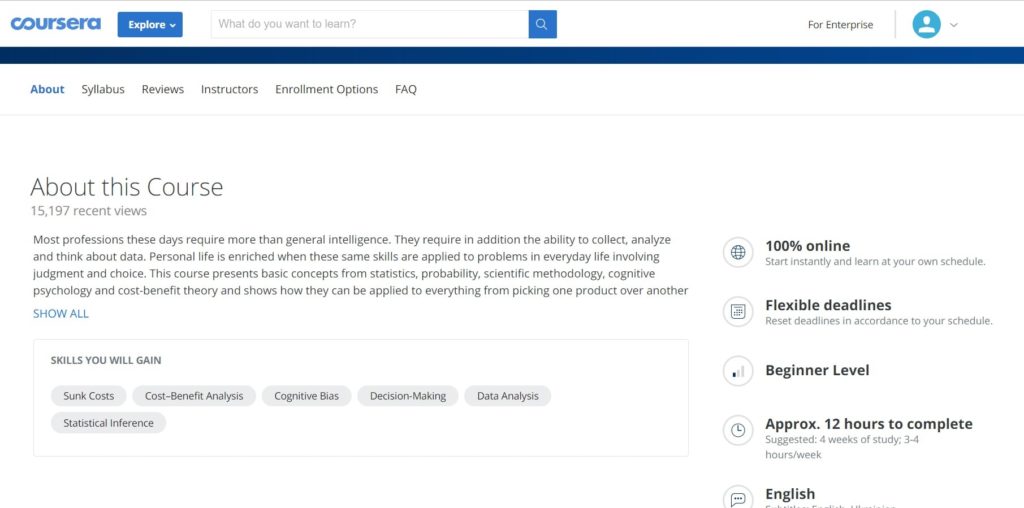
Syllabus
Your syllabus provides a summary of the schedule of lessons, required readings, assignments, quizzes, etc. This is an important document to keep throughout the course so you can always know what is coming next and prepare for future lessons.
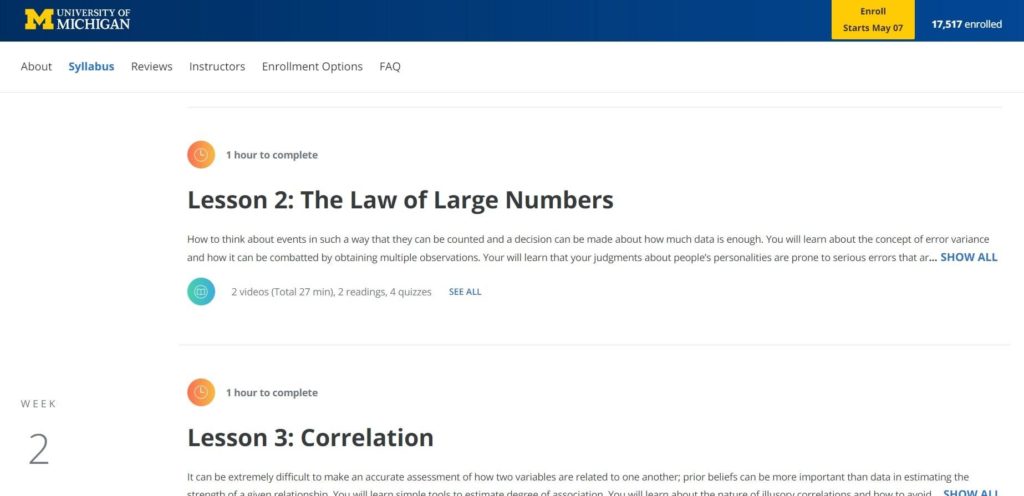
Enrollment options
When choosing your enrollment options, you can choose whether to join the course for free or to pay the fee and receive a certificate upon completion of all coursework. Many courses on Coursera have an audit option, which allows users to see most of the course materials for free.
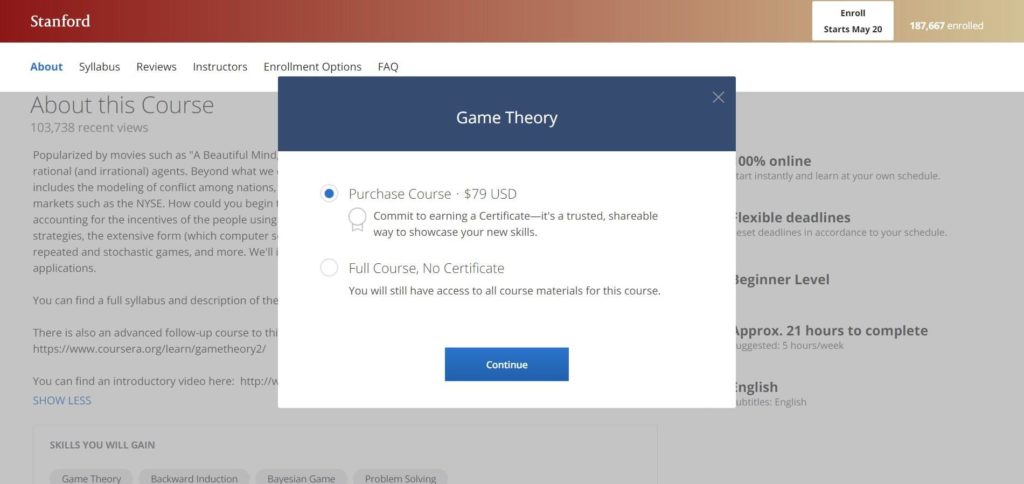
However, when you are auditing a course, you won't be able to turn in assignments or receive grades or feedback for your work. You also won't receive a course certificate.
Welcome message
Once you enroll in the course, you’ll get a notification that you can now access all the class materials. You will also receive a video welcome message from the instructor, which will explain what their background is on the subject, and where they currently teach. The message also typically includes the reason that the instructor has chosen to teach the course, and who the target audience is for the course.
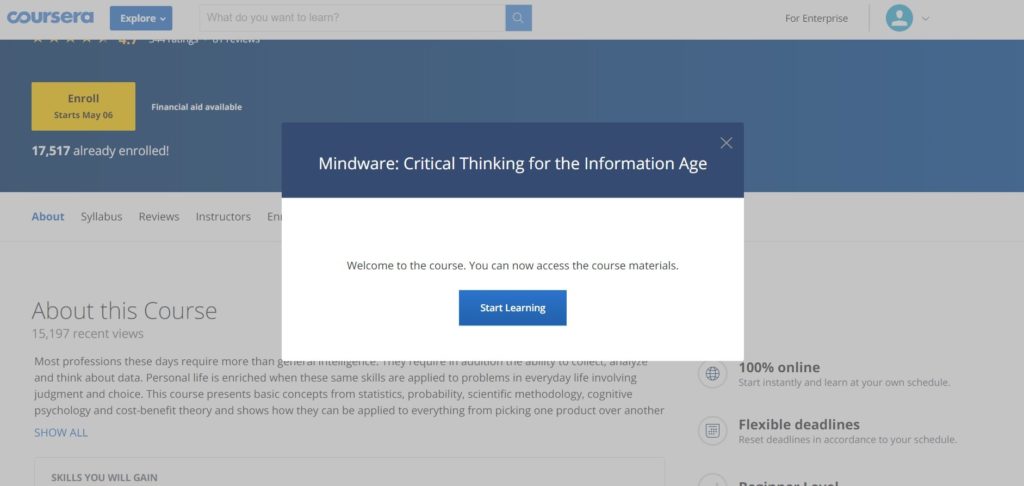
Interactive transcript
Most lessons are in video format, and interactive transcripts are available, as well as tools for taking notes while you’re viewing your lessons. You can follow along with the lesson by reading the transcript, and you are able to jump to any given moment in the video by clicking on the corresponding line in the transcript. Transcripts are even available to use on mobile apps.
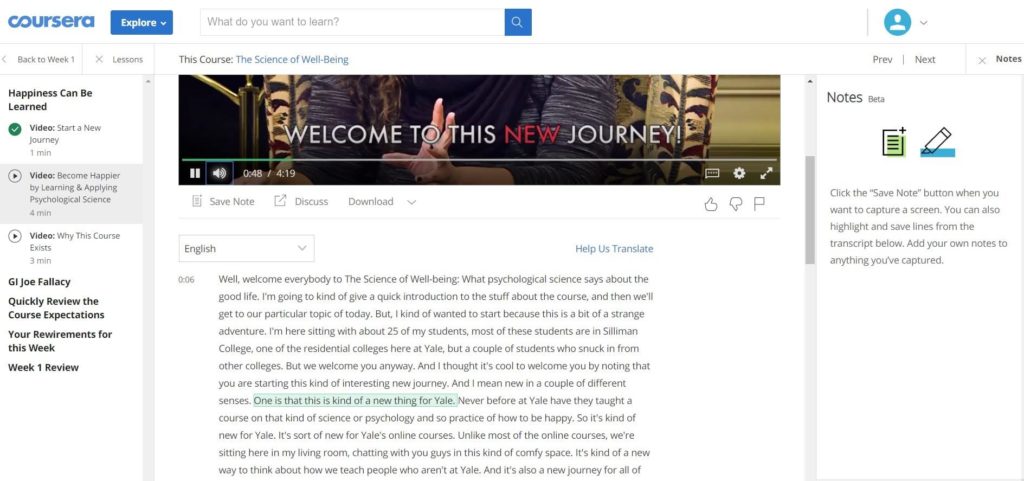
Readings
In most classes, there will be required readings. The materials are provided in the respective weeks that they will be discussed. You will be informed if the material is a required reading for a future lesson. Usually, these required readings need to be marked complete, considering that most of them are prerequisites for further lessons.
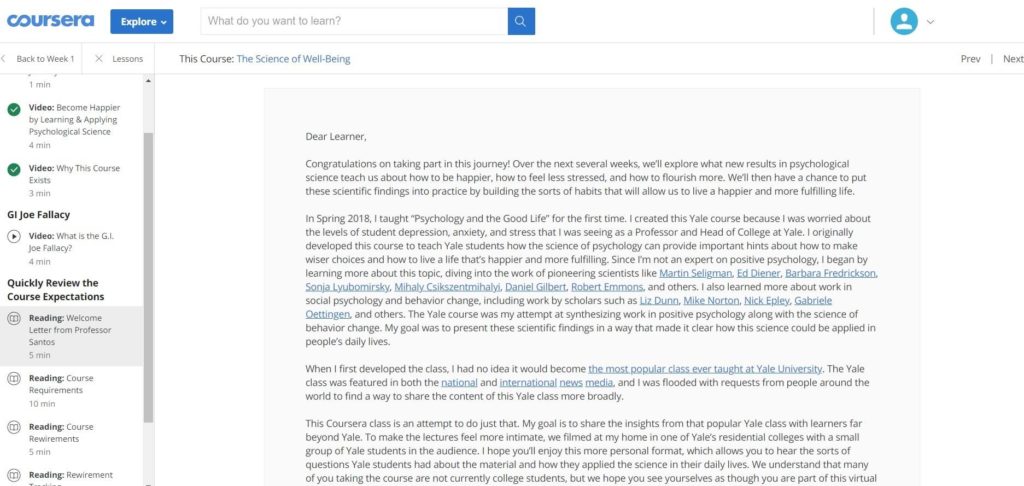
Assignments
In the course “The Science of Well-Being,” weekly assignments are called Weekly Requirements. These can be writing assignments, answering online tests/surveys, etc., as needed in the coursework.
Again, these assignments need to be marked complete, considering that most of them are prerequisites for further lessons. Most Coursera courses will give you personalized deadlines, which depend on the date you enroll in the course. However, you will not receive a grade penalty for missing a deadline, which means you can work at your own pace on your assignments.
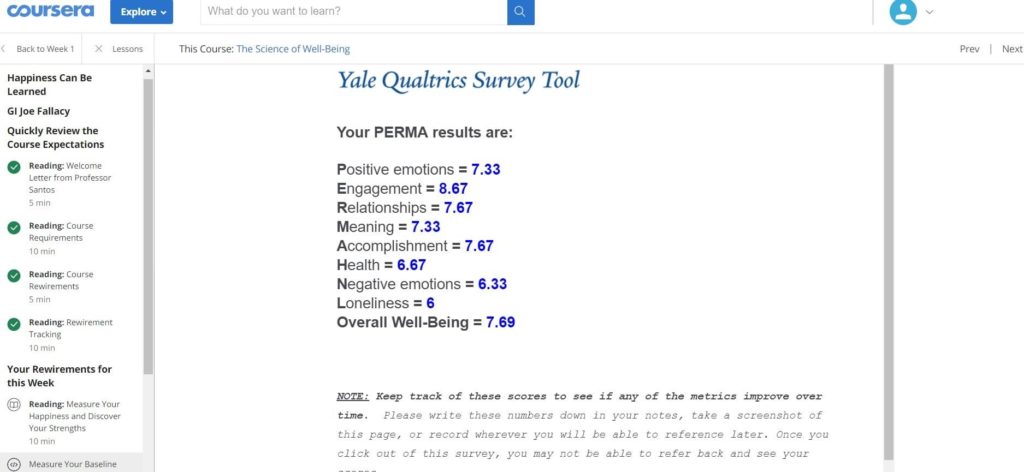
Graded quizzes and peer-reviewed papers
These are requirements when you choose to enroll for a certification. Quizzes are usually auto-graded. Peer-reviewed papers, however, are evaluated by actual people, and feedback is received at least three days after submission.
If you are completing an assignment that is peer-reviewed, all of the other students taking your course will have access to your submission. After submitting your assignment, you will receive feedback from the other students. In turn, you will need to provide feedback to other learners. If you do not give feedback, your grade may be impacted.
Your peers will grade each part of your work, and the median score of each part of the assignment will be your ultimate grade for that section. All of your final grades for each part will then be combined to calculate your overall grade. Before your assignment will be considered complete, you will have to do the required number of peer reviews for your classmates' assignments as well.
Progress bar
Your progress is shown in a timeline, giving you a big-picture view of how you’re doing for a particular course you’ve enrolled in. This helps you track your progress and identify the upcoming steps to reach your goal.
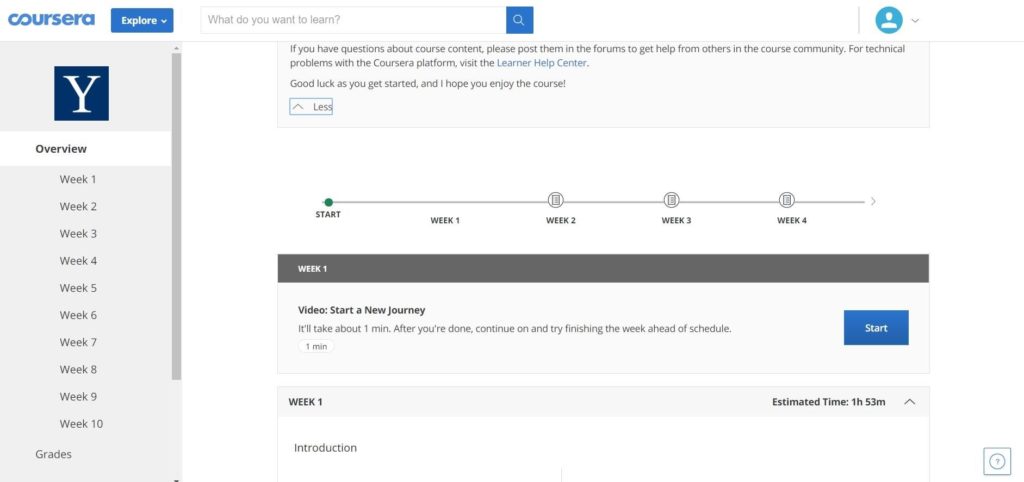
There is a progress bar for each course that you enroll in on your course dashboard. You will see a second progress bar on the home page of your course, along with a week-by-week summary of the tasks that you need to complete for that course.
What Are the Benefits of Coursera?
Cost of Tuition
The tuition cost is significantly lower compared with the cost of enrolling in a conventional school or a traditional course. This helps to open the door of higher education to people who cannot afford to attend elite universities. Also, with the seven-day trial period, you are not risking money to simply try a course out.
Convenience
The convenience and flexibility of learning at your own pace are ideal for those who are pressed for time because of other equally important priorities. Also, Coursera offers a mobile app, so you can do some of your coursework while you're on the go, or even just review what you have already learned.
While some courses have deadlines for assignments, they are easy to keep up with. Students are typically given several weeks to finish any quizzes. Learners often choose to work on their coursework whenever they have the time or feel like it. Because learning happens in an informal setting, you can choose where you learn, and revolve the schedule around your life.
Further, anyone can sign up to take a Coursera class. You don’t have to have a degree or any previous knowledge to take a course—you only need to have a willingness to learn. This makes Coursera convenient and accessible to anyone.
Quality
The lessons are of better quality, considering that the courses are taught by experts in their fields. Further, these lessons are delivered through various media platforms, engaging the different learning styles of every individual. Coursera also gives learners the opportunity to share ideas and knowledge with others, and helps improve lifelong learning skills by giving students easy access to global resources.
Finally, because the lectures tend to be short and address single topics, instructors are forced to weed through the material that they talk about to the class, so you know that you are getting the best and most important knowledge as you're listening to the instructor speak. Instructors also have to use superior teaching methods in order to reach all types of learners.
Challenge
The coursework is challenging enough to motivate students to learn more and not be overwhelmed that this level of education is out of their reach. Especially because students can often move at their own pace, users can choose how challenging they want the experience to be for themselves.
Speed of Learning
Taking online courses promotes active learning. Online learners are able to grasp the concepts of lessons offered on Coursera faster than people who are learning in a conventional way.
In fact, research has shown that students are able to retain more information through the process of active learning (such as completing assignments or engaging in discussion on an issue) instead of learning by simply listening to lectures.
Students are able to absorb the information offered in lectures more attentively if they have been provided with a problem or an assignment to complete prior to the lecture.

Students retain more information through the process of active learning instead of learning through listening to lectures.
Because of this, Coursera's short lectures that alternate with assignments and quizzes are ideal for many learners.
While this can also be done in a classroom setting, it is more difficult to ensure participation from all students in a conventional setting, as some might need more time than others to understand a lecture's content, and therefore work best when they are able to listen to the lecture for a second time before completing an assignment.
Working directly with peers in a way that is facilitated by Coursera can also promote effective active learning.
Networking Opportunities
The courses give you an opportunity to network with professionals and individuals in the same field as yours. Further, it improves cross-cultural relationships, which is an important part of today's business world. Taking classes on Coursera can lead to collaboration between educators and learners both locally and internationally.
The Downside of Coursera
Coursera is not ideal for those who prefer learning in a conventional classroom environment. It’s not possible to facilitate a traditional meaningful conversation in an online classroom that has 150,000 students present.
While there are electronic alternatives such as forums, message boards, and chat rooms, the rapport of in-person communication is lost, and words and emotions can be misunderstood. Having the experience of really digging deep into a topic in small group settings with sincere human interaction cannot be replicated online.
Also, if you are not enrolled in a degree program, the courses you enroll in and finish on Coursera cannot be accepted for university credits. Does this mean that they are a waste of time?
No.
However, if you do want to go on to receive university credit, you may have to retake some of the courses that you participated in on Coursera, and potentially spend more money to relearn information that you already know.
Why I Recommend Coursera!
Hopefully this review can help you decide if Coursera is the right online learning platform for you.
There are many courses offered on a wide variety of subjects that give you the foundational knowledge necessary for career or academic purposes. Coursera is also a more affordable and convenient option for obtaining a degree (especially in business management) compared with enrolling in and attending classes on campus.
If you’re ready to expand your knowledge and sharpen your skills, try a course at Coursera today!
And be sure to check out this course, which is currently offered for free.
If you're looking for online destinations that allow you to gain the knowledge you need here are our other favorite platforms:
- Skillshare (You can read the review of it here.)
- Udemy (You can read the review of it here.)
- Masterclass (You can read the review of it here.)
More Ideas for Continuous Learning:


